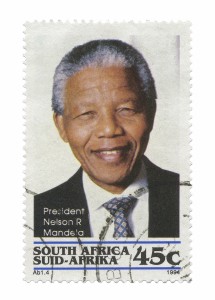As I write this, Nelson Mandela is in frail health but still with us. No, let me correct that, Nelson Mandela will always be with us.
Rather than try to summarise the achievements of this stellar leader, here are some key links for you. I’ll then share how President Mandela affected my own life and sense of leadership.
If you want to learn more about Mandela’s life:
Bio.com has an excellent short biography.
Nelson Mandelas.com has many links, videos and observations about his achievements.
The Nelson Mandela Centre of Memory has a timeline of his life.
The Independent published the text of Nelson Mandela’s speech when he was sworn in as president of South Africa in 1994.
 In 1990, while living in Boston, I attended a mass rally on the tree-lined Esplanade on the banks of the Charles River. I was there to hear Nelson Mandela speak, or even just to be near him and show my respect. His visit to Boston was well covered by the press, and you can see a slide show of his connecting with major politicians and others here; you can also get a real feel for the night by reading Brian Hecht’s report in The Harvard Crimson, from which I quote:
In 1990, while living in Boston, I attended a mass rally on the tree-lined Esplanade on the banks of the Charles River. I was there to hear Nelson Mandela speak, or even just to be near him and show my respect. His visit to Boston was well covered by the press, and you can see a slide show of his connecting with major politicians and others here; you can also get a real feel for the night by reading Brian Hecht’s report in The Harvard Crimson, from which I quote:
Mandela’s speech came late in the day — two hours behind schedule — after a long afternoon of speeches and song. And while the ANC leader was making stops in Roxbury and at the JFK Library, the crowd at the Esplanade’s Hatch Shell slowly grew [to 250,000], sometimes impatiently but always expecting something great.
One woman in a striped red shirt pushed her way through the seemingly unpenetrable crowd with a small child on her shoulder. “It’s not for me,” she pleaded with the displaced observers. “I just want my son to see Nelson.”
And although many cursed the long wait, everyone was on a first name basis with Nelson. “If Nelson could wait 27 years,” the prevailing wisdom whispered, “we can wait a few more hours.”
I can tell you that I recall that night and his speech vividly today. It was that powerful.
Years later, in 2006, I travelled to South Africa for the first time — a business trip to do some leadership development work with one of the global mining companies with a presence there. I managed to carve out a little downtime and arranged for a guided tour of Soweto, where I was able to visit many of the locations important to the anti-apartheid movement. (The Guardian just published a wonderful pictorial report on “What Nelson Mandela means to the people of Soweto”.)
On that tour, I was able to experience the vibrant spirit of the township and learn more about its heritage. One of the highlights of this visit was strolling down one of South Africa’s most famous streets — the only one in the world to have housed two Nobel Prize winners, President Mandela and Desmond Tutu. One cannot help but be move by such greatness, with the two homes within a few hundred metres of one another. President Mandela’s house is open to the public and provides you with a glimpse of his life at one particular moment in time.
Years later, I saw the movie, Invictus. The moment when Mandela, wearing the team colours of the Springbok (which were a powerful symbol of Apartheid ZA), presented the Rugby World Cup trophy to the team’s captain on the world stage still stands, to my mind, as one of the greatest leadership moments in my lifetime given its humility, symbolism and its transformational impact on South Africa and the rest of the world.
While I could write many posts about my own high estimates of Nelson Mandela as a leader (his determination welded to a soaring vision, his preference for change via a peaceful (if possible) process, his aspiration for unalloyed freedom for all), I was touched by the comments of others on About.com in this regard. For example, one contributor, identified only as “Ene”, said: “He showed love for the people, the country, and fought for their freedom. Clearly it wasn’t convenient, but it was a task he took on happily no matter the pain he suffered.”
The body of Nelson Mandela may have fallen into irreparable poor health. But the spirit of the man will endure as long as people admire true leadership for its power to both improve society and inspire people to make their own lives better.
